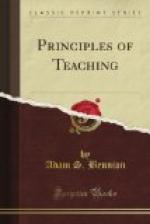“Such rapid-fire questioning, Miss Stevens rightly holds, defeats its own ends. It maintains a nervous tension in the classroom that must in the long run be injurious. More than that, it is a symptom of the fact that the real work of the hour is being done by the teacher, and the pupil’s share is reduced simply to brief, punctuation-like answers to the teacher’s questions. Such questions appeal to mere memory or to superficial judgment rather than to real thought; they cultivate in the pupil neither independent judgment nor the power of expression; they ignore individual needs and discourage initiative; they make out of the classroom a place to display knowledge, rather than a laboratory in which to acquire it.
“The second half of the proposition, that most Sunday school teachers do not ask questions enough, has not been established by any such investigation as that of Miss Stevens. A similar study, on the basis of complete stenographic reports, of typical Sunday school lessons, would be a most valuable addition to our resources in the field of religious pedagogy. Till such a study is made, one must simply record his conviction that Sunday school teachers, as a general rule, ask too few, rather than too many questions. This conviction is based upon general observation and upon the frequency of such remarks as, ‘I just can’t get my class to study,’ ’There are only two or three who ever answer my questions,’ ’My pupils don’t know anything about the Bible,’ ‘As long as I do all the talking, things go all right,’ etc.” Weigle, Talks to Sunday School Teachers.
The whole matter of questioning can be made to stand out most clearly, perhaps, by listing the various types of question, the purposes which each type serves, and the characteristics of a good question.
First of all there is the Review question. The great purpose of this type of question is to systematize knowledge. Of course, it is valuable as an aid to recollection—it is a challenge to memory—but it is particularly helpful in that it makes the big essential points in a course stand out in relief with minor points properly correlated and subordinated. The review question is a guide to the pupil whereby he may see the relative significance of the work he has covered. One of our great difficulties lies in the fact that our teaching is so largely piece-meal. Today’s lesson is hurried through, isolated as it is from all that has gone before and all that may follow. The successful teacher through the review makes each lesson a link in the chain of thought that underlies the whole development of the subject in hand.
The review question is essentially a carefully thought out, searching inquiry. It calls for a turning over, in the mind, of the material of the whole course and therefore should allow ample time for pondering. If it does not stimulate a “weighing process,” it likely is merely a fact question—a test of memory. Of course, there is a place at times for this hurried type of question, but it serves the purpose only of “connecting up” and should not be mistaken for the evaluating question of review.




